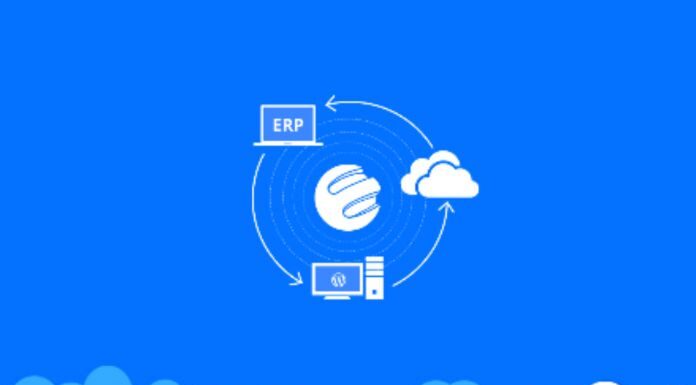ERP in Cloud: Companies must invest in their human capital allied to technology to remain competitive in the market, optimize processes, and obtain better results.
After all, as necessary as having qualified professionals, management tools bring a panoramic view of areas, increase productivity and assist decision-making. In this context, the adoption of Cloud ERP is increasingly common.
Enterprise Resource Planning software, or integrated management system, centralizes and integrates information from the various sectors of an organization, such as logistics, sales, finance and human resources, making the data flow more fluid and accessible to all involved.
Cloud computing is nothing more than the internet environment, where, through suppliers, companies can store their applications and data with cost reduction, scalability and efficiency.
When used in an integrated way, these two features can greatly assist operations for different reasons. It was with this in mind that we developed this article. Follow and learn more about it!
How Does An ERP With Cloud Storage Work?
A cloud ERP works 100% online. Organizations do not need physical IT infrastructure to hire them, as the software is stored on third-party servers.
The main difference between a cloud computing system and an on-premises ERP is that, while on-premises management can only be done from a single computer, the cloud version can be accessed from any device and location as long as there is a connection. As you can imagine, this brings flexibility, agility and efficiency.
In practice, a cloud platform is composed of three parts that integrate and allow the resources of an ERP to be used. The application layer is best known, which acts as the gateway for data. That is, it is through this environment that teams enter information from their respective areas.
The second layer is composed of a database that stores the information collected and that will later be used in a company’s processes. Furthermore, depending on the specific characteristics of each user, there needs to be a framework through which ERPs can be adapted and customized.
What Are The Advantages Of A Cloud ERP?
Although cloud computing is already a widely used resource in the corporate world, it is still common for some to be afraid or suspicious of its security and other factors. The fact is that, in addition to being safe, since service providers are responsible for this process, an ERP in the Cloud brings several benefits to companies. See the main ones:
Accessibility
With the digital transformation and behavior changes brought about by the coronavirus pandemic, it is increasingly common for organizations to implement remote work.
For the model to be efficient, they must adopt appropriate strategies, processes and technological tools. One way to promote integrated and organized management is through the ERP in the Cloud, which can be accessed by different teams and users, regardless of where they are.
Ease Of Installation
ERP with cloud storage is easier and faster to implement as it does not require internal infrastructure from the contractors. Another aspect is about adaptability, as the installation of the platform is composed of modules that meet specific demands, as well as different sectors and business sizes.
Integration Of Areas
One of the advantages of cloud ERP related to on-premises software is the more remarkable ability to integrate the platform, which allows companies to obtain more business value from other applications stored on the internet. When they are traditional systems, organizations tend to buy and use solutions separately, which harms management, organization and results.
Automatic Updates
When a business adopts cloud-based technological solutions, it stops worrying about updates, as they are done automatically by the suppliers. It is worth noting that this is a fundamental process because when a platform is updated, more modern functionalities are implemented. Data protection features are optimized, among other details that directly contribute to the performance of the ERP.
Investment Optimization
While the monthly fee for a cloud EPR is a little higher than an on-premises platform, there is a significant long-term benefit as hosting, backup, security, and other features are already included in the system costs.
On the other hand, traditional software has high expenses related to the maintenance of the IT infrastructure, as well as operating system and security licenses. In addition, this type of system is more prone to cybercrimes, such as data hijacking and malware contamination, requiring constant, expensive updates.
These were some of the differentials of hiring an ERP stored in the Cloud, which naturally goes against a significant trend of organizations worldwide.
How To Apply To My Company?
After reading this far, you might wonder how to implement a cloud ERP for your business. Whether to start using this type of software or to migrate from a local solution to the internet, it is possible to choose between several suppliers in the market.
For this reason, the organization’s decision-making must be well-founded to choose the most appropriate alternative and avoid regrets or losses.
- functionalities: the first step is to carry out an internal survey of the company’s primary needs, such as stock management or issuance of invoices and slips, making it easier to choose an ideal system for the demands;
- personalization: a modern cloud ERP must offer the possibility of customizing packages and modules according to the demands and characteristics of each business, so it is worth questioning this point with the partner to be hired;
- support: another essential aspect to consider is customer service and support provided by the supplier, which must be fast and uninterrupted;
- cost-effectiveness: when hiring a solution, it is worth weighing the costs of each one about the features and differentials offered.
There is no “cake recipe” for choosing a cloud ERP. In this case, the best option will always be the one that best meets the company’s needs, reflecting on customer satisfaction, increased sales and results.
Also Read: Consumer Behavior: What Influences The Purchase Decision?

